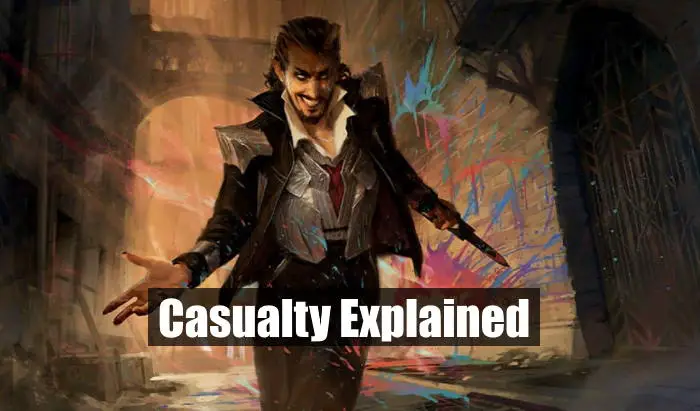Streets of New Capenna is almost here. Magic: the Gathering’s newest set officially hits stores April 29, with prerelease events set to take place a week earlier. Each new set introduces exciting new mechanics to the game of Magic, and Streets of New Capenna is no different. Much of the set is based around the five Crime Families and their power struggle for New Capenna. In addition to their own unique strengths, weaknesses, and personalities, each Capenna family comes with a brand new mechanic. In this article, I’ll cover everything you need to know about the Maestros family mechanic: Casualty.
Casualty is an optional additional cost found on certain cards that requires players to sacrifice a creature with power equal to or greater than the specified Casualty cost. If the player does so, an ability is then triggered copying the original effect of the spell.
As with a lot of mechanics, Casualty can get a bit complicated. Not to worry. In this article I’ll answer all your questions as well as give my picks for the strongest Casualty cards.
What Is Casualty?
Casualty is an additional casting cost found on certain cards from Streets of New Capenna. This is the “Grixis” mechanic, so only Blue, Black and Red cards have it. Casualty is similar to the Kicker mechanic, only instead of paying extra mana, players must sacrifice a creature.
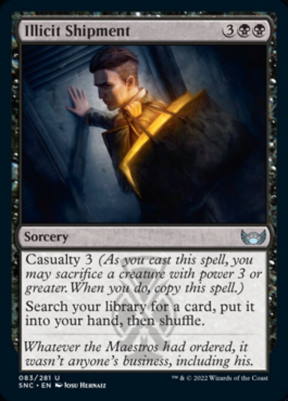
RELATED: New Capenna Spoilers: What We’ve Seen So Far
How Does It Work?
As you cast a spell with Casualty, you can choose whether or not to pay its Casualty cost. If you choose to pay, you get to copy the spell’s effect. Take Join the Maestros for example. Join the Maestros has Casualty 2. That means when you cast it, you can sacrifice a creature with power 2 or greater. If you do, you get to create a second 4/3 ogre. Remember that you can always ignore the additional Casualty cost and cast the spell for its regular mana cost.
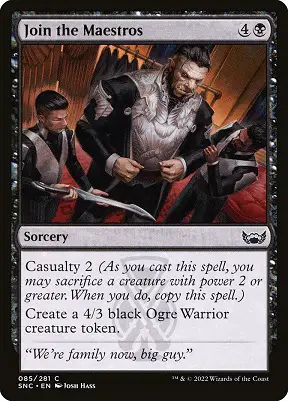
When Can You Use It?
You choose whether or not to pay a spell’s Casualty cost at the same time you pay the mana cost. One great thing about the mechanic is that you can cast a Casualty spell in response to something your opponent does. If you’re opponent aims a removal spell at your creature, you can sacrifice the same creature that was about to die anyways, and get an extra spell!
FAQs
Can You Choose New Targets for a Casualty Copy?
Yes you can! If the spell requires targets to be chosen, you get to choose those targets again when the copied effect resolves. Pretty great right?
Can You Pay the Casualty Cost Again For the Copy?
Unfortunately, no you can’t. With Casualty, the entire spell isn’t actually copied. Instead, the effect of the card is copied and placed on the stack as a triggered ability. This means you won’t have the chance to pay the Casualty cost again.
Can You Sacrifice More Than One Creature For a Casualty Cost?
No you can’t. While it might be tempting to sacrifice two 1/1s to pay for Casualty 2, it doesn’t work like that. You can only sacrifice one creature whose power is equal to or greater than the Casualty number.
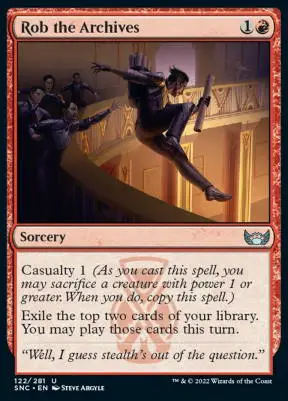
How Does Casualty Work With Counter Spells?
Paying a Casualty cost immediately triggers an ability which copies the original card and goes straight onto the stack. An opponent can counter that ability, or counter the original card, but they can’t counter both with the same counter spell. This is good news for the mechanic since paying for a spell, and sacrificing a creature, just to have the whole shebang countered would be devastating.
Full Card List
- A Little Chat
- Cut of the Profits
- Cut Your Losses
- Dig Up the Body
- Grisly Sigil
- Illicit Shipment
- Join the Maestros
- Light ‘Em Up
- Make Disappear
- Rob the Archives
- Rooftop Nuisance
RELATED: Streets Of New Capenna: All Available Products
Best Cards
Cut Your Losses
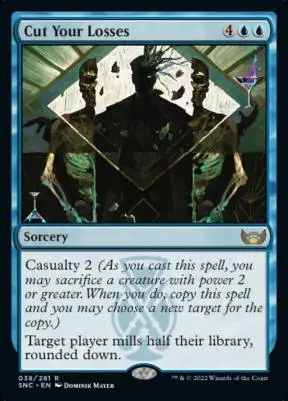
Cut Your Losses has a simple yet powerful effect: Target player mills half their library. On top of that, it has Casualty 2. All you have to do is sacrifice a 2 power creature, and your opponent has to mill half their library again! Or, if you’re playing Commander, you can choose a different opponent the second time and cripple two players at once. While the six mana casting cost probably keeps this card from seeing play in faster formats, Cut Your Losses could be a powerhouse in Commander.
Cut of the Profits
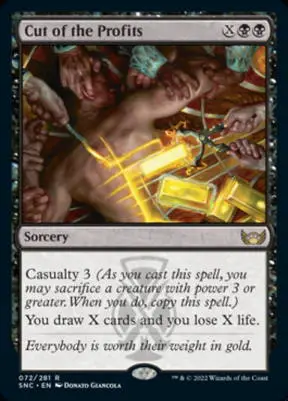
The other rare card, Cut of the Profits costs two black mana plus X. Then you get to draw X cards and lose X life. While we’ve seen a lot of cards like this before, Cut of the Profits gives you the chance to draw twice as many cards by sacrificing a creature with power 3 or greater. The downside is that you also lose twice as much life. Still, if you can find a reason to want to sacrifice your creature anyways, Cut of the Profits can cause a huge swing. Like the former card, I also expect this to find a comfy home in many Commander decks.
Anhelo, the Painter
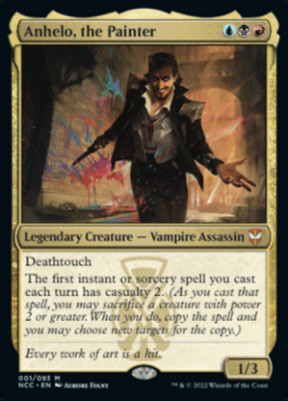
Anhelo, the Painter isn’t actually a New Capenna card, but rather a part of one of the new Commander precon decks. He gives the first instant or sorcery spell you cast each turn Casualty 2. That’s huge! Being able to copy potentially giant spells by just sacrificing a 2 power creature? Sign me up.
RELATED: All MTG Commander Precons – The Complete Guide
End Step
Casualty brings a cool new flavor to the Grixis colors and has the potential to have an impact in constructed formats. Just how big that impact will be remains to be seen. Nevertheless, this mechanic along with the other four mechanics from the Capennan Crime Families is sure to bring exciting new interactions to MTG for quite some time.
I hope this article has answered any and all questions you might have, and I hope to see you out there on the grimy streets of New Capenna.
